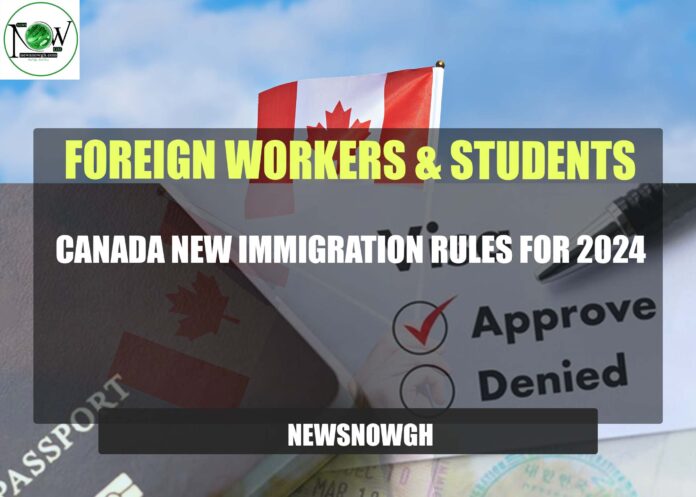Canada New Immigration RULES for 2024: Foreign Workers & Students | IRCC
As part of its ongoing efforts to better control the rise of temporary residents, Immigration, Refugees and Citizenship Canada (IRCC) has issued yet another round of limits for several temporary residency programs, including those for international students and temporary foreign workers.
Reduced 2025 cap on new permits for overseas students
Changes
- In 2025, Canada will limit the number of authorized study permits for foreign students to 437,000, which is 10% fewer than in 2024. In 2026, it anticipates keeping this figure constant.
- Additionally, applicants for master’s and doctoral degrees, who were exempt from the restriction in 2024, will be included in the 2025–2026 cap. About 12% of the cap allocations will be set aside by IRCC for these students.
- In order to control immigration growth and enhance the integrity of student programs, the IRCC initially implemented a temporary two-year cap on the issue of specific new international student permits in April 2024. For 2024, it had set a goal of 485,000 new study permits.
Impact
- A more stringent cap might make it more difficult for additional overseas students to study in Canada.
- Additionally, because of the lower cap, Canadian educational institutions may have even less access to international students as a result of this adjustment.
- We will soon have more information on how the cap is calculated and how it will be distributed across Canada’s provinces and territory in 2025.
Additional limitations for master’s degree students’ spouses
Changes
- Open work permits, which normally permit holders to work anywhere and for the majority of employers in Canada, will only be available to spouses of international students enrolled in master’s degree programs if the program lasts at least 16 months starting later in 2024 (the precise date has not yet been announced).
- Spouses of international students enrolled in master’s, doctoral, and other specific professional degree programs were no longer eligible for open work visas from the IRCC as of April 2024. It was not, however, dependent on how long the program lasted.
Impact
- When this regulation takes effect, spouses of foreign students enrolled in master’s degrees may have to look for alternative employment opportunities while they are in Canada.
- Future information is anticipated to include whether current holders of spousal work permits will be eligible to apply for work permit renewals.
A new language requirement under the PGWP Program (Post-Graduation Work Permit)
Changes
- Any foreign student seeking a PGWP after November 1, 2024, will have to show that they can speak French or English at a level of 7 on the Canadian Language Benchmark (CLB) for university graduates and 5 on the CLB for college graduates.
- There are currently no language requirements for PGWP applicants.
Impact
- Foreign students who do not understand English or French will probably find it more difficult to be eligible for a PGWP, which permits graduates of specific recognized learning institutions in Canada to work in Canada for a maximum of three years, due to the additional language requirement.
- Over the following three years, the IRCC anticipates that this restriction will lead to the issuance of 175,000 fewer PGWPs.
Spouses of foreign nationals employed under the International Mobility Program (IMP) and Temporary Foreign Worker Program (TFWP) are subject to new work permit limitations.
Changes
- Spouses of foreign nationals employed under the TFWP and IMP who work in professional or managerial positions or industries with a labor shortage will be the only ones eligible for open work permits starting later in 2024 (the precise date has not yet been disclosed).
- Currently, limitations on the foreign worker’s function or occupation outside of TEER 4 and 5 occupations are not part of the eligibility requirements for work permits for spouses of temporary foreign workers.
Impact
- Spouses of temporary foreign workers may need to look for alternative employment opportunities while they are in Canada.
- Many foreign nationals looking to work temporarily in Canada may find it less appealing as a result of this restriction. Employers may therefore need to hire more Canadian citizens or people who already have status allowing them to work in Canada to fill positions that are not managerial or professional, or that are in industries without a labor shortage.
Background
A “soft cap” on temporary residents was declared earlier this year by the Canadian government, which aims to lower the country’s temporary resident population from 6.2% to 5% over the following three years due to strains on housing affordability and other infrastructure.
The government has been implementing policy changes to tighten the international student program and limit eligibility requirements for temporary foreign workers to achieve this goal. They have also been enforcing employer compliance and increasing the rigor of Labour Market Impact Assessments to make sure that there are no adverse effects on Canadian workers.
Gazing Ahead
As Canada’s economy and labor market change, the government will keep evaluating its immigration laws. The 2025–2027 Immigration Levels Plan, which is scheduled for release on November 1, 2024, will incorporate the suggested decrease of temporary residents, according to the IRCC. This could lead to further policy modifications and limitations.
To better meet the needs of the labor market and immigration objectives, the IRCC has also announced that it will be modifying the Post-Graduation Work Permit Program later this year. This is expected to mean more adjustments for overseas students.
Additionally, as the global number of displaced people keeps increasing and foreign nationals already in Canada struggle to obtain a path to permanent residence status, Canada is seeing a sharp increase in asylum claims, which adds to the country’s rising immigration case volumes. The government may enact more immigration policy limits to fortify the Canadian asylum system.
Follow us on Newsnowgh.com to stay updated on the latest information regarding work permits, visa application processes, paths to permanent residency, and visa-sponsored employment.


